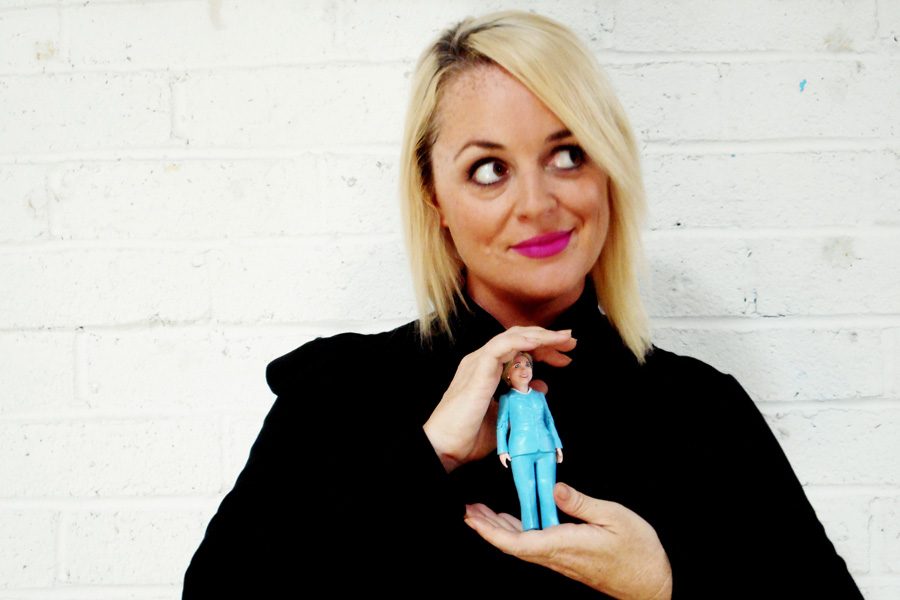Northwestern, Evanston authors write books about election
Maegan Carberry (Medill ‘04) with a Clinton “surrogate.” Carberry is the author of the novel “Do I Have to Vote for Hillary Clinton?” that follows three friends facing conflicts over the 2016 election.
November 2, 2016
A&E
For Jonathan Allen, John Wilson and Maegan Carberry, participating in the upcoming elections has meant far more than filling out a ballot.
All three authors have penned books with different takes on the figures of this year’s biggest political showdown, presenting the candidates’ strengths and flaws, as well as the ways they are portrayed across the media.
Allen, a political science lecturer who teaches students at Medill on the Hill, helped work on “HRC: State Secrets and the Rebirth of Hillary Clinton” in 2012, when many assumed Clinton would run in 2016. The book focuses on Clinton’s time as secretary of state and was on the New York Times Bestseller list for two weeks.
“(The story) took on … the feel of a rebirth and a political machine being built,” Allen said.
Allen said he and co-author Amie Parnes interviewed both allies and adversaries of Clinton. He said some were “blown away” by Clinton’s attention to policy detail, as well as her kindness and humanity — qualities that contrast the cold and calculating public image she is often portrayed to have, Allen said.
However, Allen believed Clinton’s reserved nature and focus on details in her campaign have made it difficult for voters to connect with her.
John Wilson, an Evanston resident, took a more direct political stance with his book. “Trump Unveiled: Exposing the Bigoted Billionaire,” published in October 2016, is a “progressive critique” of the candidate, Wilson said. The book’s focuses include supposed business failures and personal prejudices.
“It’s unfortunate that his terrible character causes people to miss his terrible policies,” Wilson said.
Despite the potentially controversial nature of the book, Wilson said he never feared backlash from Trump supporters, whose anger he thought was more focused on the mainstream media. But Wilson conceded the possibility Trump will sue him as the candidate has suggested he will take legal action against some of his critics.
Maegan Carberry (Medill ‘04) brought the election into the realm of fiction this August, writing a novel that centers around three friends with different political views navigating the election, focusing on the strain it puts on their personal relationships.
Carberry said she wanted her book, “Do I Have to Vote for Hillary Clinton?” to allow young people to engage with complex political issues. Although social media has become a platform for such discussions, Carberry said it can also provoke groupthink that limits exposure to contrasting opinions.
“Something that goes viral is fundamentally the lowest common denominator,” Carberry said. “I think it’s lowering discourse in that sense.”
Carberry added she believes gender politics have played a large role in the election. She said if Clinton is elected, she may have freedom to directly raise questions on gender inequality, in the same way Obama tried to tackle racial issues during his two terms.
All three authors agreed the 2016 election cycle has been unusual because of the candidates involved and how the media responded.
“It’s all such a blur,” Carberry said. “A lot of us will be searching and trying to figure out how it got so bad.”
Though Wilson disputes the idea this election will lead to the downfall of the Republican Party, he said future politicians may end up adopting “pseudo-populist” rhetoric in the style of Donald Trump.
No matter the outcome next Tuesday, the unpopularity of both major party candidates is unparalleled, Allen said.
“We seem ready to elect somebody who is going to be disliked by a lot of people heading into office,” he said. “That doesn’t augur well for repairing the fabric of our American community.”
Email: madelineburakoff2020@u.northwestern.edu
Twitter: @madsburk



